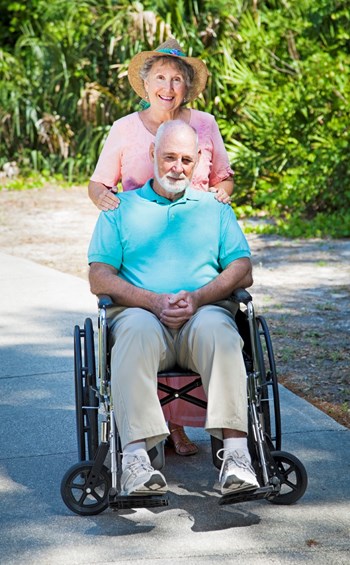
Meet the residents of the fictional Manor Woods condominium. Mrs. Jones loves her unit. She’s been living there for 30 years and while she’s still independent, she walks and talks a little slower than she used to. Next door, David was in a motorcycle accident a few months ago and is still recuperating from his two broken legs. A few floors down 12-year-old Brenda stays at home alone for a few hours every day while her parents finish working.
On a typical day, everyone just goes about their business, but what if a typical day suddenly turned not-so-typical? Perhaps a fire starts, the power goes out or there’s a gas leak. Some elderly, disabled and special needs residents can fend for themselves in an emergency, but others can’t. Your responsibility is not to be a caretaker but to know which residents need help.
Most of the residents will be OK, but Mrs. Jones, who might get out of her house, also has the start of dementia and becomes confused at all the ruckus. David can’t walk right now and Brenda is too scared to open the door to anybody. Who looks out for these folks?
An emergency situation can happen at any time, anywhere and how you respond to it and how fast, can be the difference between life and death. All residents will need to get out of the building, if necessary, as fast as possible, but it’s important to know which ones may need a little extra assistance.
Marita Butzbach, vice president of association management at Lang Management Company in Boca Raton, says that she wouldn’t ask a resident if they needed special assistance. “You can’t ask anyone about challenges or handicaps they have,” she says. “Most of the time though people will tell you upfront.”
And Butzbach has good cause to not ask, even if it’s to help the resident. Under the Fair Housing Act, it is usually unlawful for all housing providers to ask if an applicant has a disability or if a person intending to reside in a dwelling or anyone associated with an applicant or resident has a disability, or ask about the nature or severity of such persons' disabilities.
For example, say you offer accessible units to persons with disabilities; you can ask if they have a disability because you want to see if they can use the features of the unit. However, you may not ask if they have other types of physical or mental impairments.
However, if Butzbach found out about an at-risk situation—say a latchkey kid—that wasn’t told to her by the residents, she says that they then find out what to do with the information. “For a latchkey kid, we’d bring them to our office and try to find an emergency number for them,” she says. “If there was an emergency we’d bring law enforcement with us.”
At Butzbach’s Valencia Palm’s property in Delray Beach, a gated single family adult community, the management company has created an extensive emergency response plan for Florida’s hurricane season. “If any at-risk resident needs help or needs to be evacuated, the Community Emergency Response Team (CERT) assists the managers with those residents,” says Butzbach. “They are trained with defibrillators and in CPR.”
According to Gail Matillo, MPA, director of the Elder Housing Unit, Department of Elder Affairs in Tallahassee, there are more than 75,000 elderly persons currently living in subsidized apartments and more than 25% of them are considered frail or disabled.
“Florida’s Department of Emergency Management, stakeholders, associations, management companies and owners/operators have done an excellent job of training their
staff and residents on disaster preparedness and evacuation procedures,” says Matillo.
“Drills are conducted in many communities on a regular basis. Sometimes, depending on the type of disaster, it is better for frail or disabled residents to stay put. In subsidized housing, sponsored by the U.S. Department of Housing and Urban Development ( HUD), most disabled units are built on the first floor, making it easier for them to evacuate, if necessary.”
Matillo also explained that in Florida, most frail residents are required to register with a special shelter in their county every year. “A special shelter provides assistance due to physical impairment, mental impairment, cognitive impairment, or a sensory disability that exceeds the basic level of care provided at a general population shelter, but does not require the level of care provided at a skilled medical facility.”
If it’s a HUD-subsidized housing community, service coordinators work on behalf of the residents by assisting them with various programs and services. “Public service announcements by mass media outlets and the local television stations are sources of additional information for those who may have a special need,” says Matillo.
Florida has a vast array of training, volunteers and lead agencies that help with disasters. The Division of Emergency Management and the counties along with the local Red Cross conduct disaster planning exercises on a regular basis. “The state designates special volunteers to help with elders and special needs residents,” says Matillo.
Even with a clear plan or protocol in place, each resident may need to be treated differently during an actual crisis. Larry Gard, Ph.D., lives in a high-rise building and has watched residents ‘age in place.’ He says the staff tries to be supportive of older residents—for example, going out of their way to assist with packages—but believes more training is needed to understand how to deal with older residents whose mental or physical conditions have deteriorated.
“If staff must help evacuate a cognitively-impaired older adult, they need to know how to avoid making the individual even more agitated,” says Gard, a clinical psychologist with specialized training in geriatric psychology from Northwestern University Medical School. “For example, if you’re trying to alert a confused older resident that there was a fire in the building, pounding on their front door and yelling might not be the best approach.”
Gard says that if time permits, a calmer intervention such as a phone call asking them to come to their front door might be preferable.
“Similarly, since a resident might not be used to staff coming to their unit unannounced, it might be better to enlist a neighbor to knock on their door,” he explains. “Instructions should be given one step at a time. Cognitively-impaired individuals may have difficulty following a sequence of instructions given all at once. If possible, try to make sure that the area is well lit and that surrounding noise is minimized.”
Gard also suggests that managers have up-to-date contact information for residents, especially someone that the property manager can contact in case of any special needs.
The Senior Home Safety Network is another organization that can help address any potential issues before a crisis occurs. The SHSN is a national network of inspectors dedicated to helping seniors and adult children who are too busy or too far away to keep parents home safe.
“Our goal is to help them live safety at home for as long as possible,” says Dan Howard, the president of Senior Home Safety Network in Freeport, Pennsylvania. “People still own the property in a multifamily building and the property manager reacts to things that people notice,” he says. “For example, the ceiling fell; there was a leak, etc. They are not attuned to look around and prevent those issues from happening.”
As for teenager Brenda, for example, she was properly instructed by her parents to not open the door to strangers but that may make your job a little harder in an emergency. Unfortunately, Brenda’s parents also feel uncomfortable telling you that their child is home alone. If someone shares this information with you, you could try to convince them that, in an emergency it could save their child’s life. The parents may provide you with emergency phone numbers and any language-barrier information. However, if there’s a building or property emergency, she might not let you in or evacuate with you. A good property manager needs to work with the parents to create a system of communication with their children.
And, if Brenda still doesn’t open the door during an emergency, have a uniformed firefighter or police officer accompany you to the door to explain the emergency.
Although every person is ultimately responsible for his or her own safety in the event of an evacuation, management and staff should be the guiding force to make certain an evacuation goes smoothly. In any emergency situation, residents and occupants will look to you and your staff for leadership. They’ll want to know what’s wrong, what to do, where to go and how to get there.
Lisa Iannucci is a freelance writer and a frequent contributor to The South Florida Cooperator.






Leave a Comment